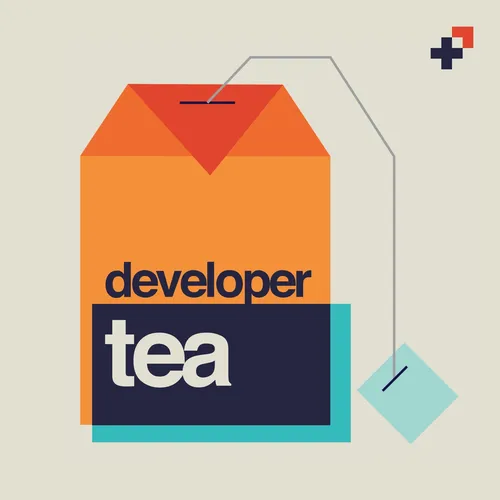
Developer Tea
Developer Tea exists to help driven developers connect to their ultimate purpose and excel at their work so that they can positively impact the people they influence.
With over 17 million downloads to date, Developer Tea is a short podcast hosted by Jonathan Cutrell, engineering leader with over 15 years of industry experience. We hope you'll take the topics from this podcast and continue the conversation, either online or in person with your peers. Email: [email protected]
- Update frequency
- every 7 days
- Average duration
- 17 minutes
- Episodes
- 1268
- Years Active
- 2015 - 2025

A Way Out of Overwhelm
Choose one thing. Only one important thing. Do that over and over. That's your way out of overwhelm.
📮 Ask a Question
If you enjoyed this episode and would like me to discuss a question that you have o…

Understand Position and Interest To Make Better Collaborative Decisions
What people ask for is not the same as why they ask for it. What people want isn't as simple as what they say they want.
Understanding the why is critical - the interest is just as important as the po…

Future Thinking Is Not Planning For A Single Course of Events
People often erroneously plan for specific futures. This leads down a pathway to failure most times.
This is because the future is rarely what we expect it to be. We can think in terms of multiple pos…

Balancing Decision Frames
Making good decisions is about tuning context. If you can't determine the context that matters, the decision itself is impossible to measure against. All decisions can be framed within a context with…

Copy of How Feedback Loops Shape Our World (Fixed Audio)
Feedback loops shape everything around us. We make a change or adjustment, watch for what happens, and repeat. This happens with people in the most unexpected ways. Tuning in to this adjustment loop …

Reframing Every Decision As A Tradeoff
Every decision is a tradeoff. If you are looking for the "right" decision, you can reframe this to the "optimal decision based on my desired outcome." This could have the effect of aligning your bias…

Judging Quality of Decisions Instead of Outcomes in Performance Reviews
Is your performance review judging the luck or random events of a person's career? What about the times they made the right decision in a bad situation? The outcome may not be desirable every time, e…

How Feedback Loops Shape Our World
Feedback loops shape everything around us. We make a change or adjustment, watch for what happens, and repeat. This happens with people in the most unexpected ways. Tuning in to this adjustment loop …

Solve Specific Problems by Composing General Solutions
Almost every complex problem can be broken down and solved. Thinking from the other side - learning general solutions and how to compose those will give you the ability to build against the broken do…

Common Excuses for Not Setting Goals
Today, we'll dismantle a few common excuses often provided for not setting goals. We also briefly discuss the SMART goal-setting framework.
📮 Ask a Question
If you enjoyed this episode and would like m…

Better Process to Match Intentions to Actions
Your time is full of intent, but if you reflect back - how often do you do what you intend?
Our actions are usually trying to reach some outcome, but are haphazard and habit-driven. What if we made th…

Change Through the Lens of Adjustment and Maintenance
Change is inevitable, but it's not always what we think it will be. Our framework for change should be ready for change we don't expect as much or more than for change we do expect.
📮 Ask a Question
If…

Built to Change
The flow of change is inevitable. Are you building with it, or ignoring it in vane?
📮 Ask a Question
If you enjoyed this episode and would like me to discuss a question that you have on the show, drop …

Deconstructing Status Meetings
What if status meant something different? Your status meeting overload is probably a symptom of a more important problem: you're not sure what you're measuring against.
🙏 Today's Episode is Brought To…

Lower Cognitive Load - Pick Your Tools, Then Do Your Work
Lower cognitive load by picking your tools, and then using them. Avoid the constant evaluation of tooling; it's an intuitive response to the amazing leverage you experienced when you first picked up …

Lower Cognitive Load - Primary Activities, Modes, and Cues
Lower cognitive load by looking at your primary activities and modes, and creating cues that help you shortcut to those modes. This importantly gives you a better signal and a spike in cognitive load…

Lower Cognitive Load - Limit Everything In Progress
Cognitive load will destroy your productivity. In this mini-series, we talk about ways to reduce your cognitive load. In this episode we talk about limiting work, and everything else, in progress.
📮 A…

Lower Cognitive Load - Principle of Least Surprise
Cognitive load will destroy your productivity. In this mini-series, we talk about ways to reduce your cognitive load. In this episode we talk about the unexpected effects of surprise on cognitive loa…

Applying Systems Thinking for Better Thoughts
The systems that play a role in producing your thoughts are a huge leverage opportunity in your work and life. If you pause and examine those systems through a lens of systems-thinking, you are likel…

Outside View or Anecdote? The Right Answer is Both
If you only look at your experience, you fall prey to anecdotal evidence and a whole host of other biases. But, we should be learning through iteration and empiricism. So how can we? Seek the outside…